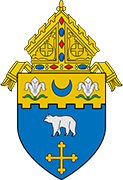Diaconate Application and Formation
Note: The inquiry stage for the next class has started. The class will begin in early 2022.
Here is a brief description of the major steps for the process of application and formation for the Permanent Diaconate.
Inquiry: A period of time when the potential candidate strives to learn more about the diaconate, the formation process, and the qualities of a deacon. This is the beginning of a discernment process, whereby the inquirer seeks to discover whether he is being called by God to the diaconate. This discernment process continues throughout the entire formation process until Ordination.
Application: (Three to six months) If the inquirer believes he may be being called to diaconate, he and his wife (if married) attend an orientation meeting with other inquirers to learn more about the formation process and what it means to be called to be a deacon. Assuming he meets the minimum requirements to apply, he receives an application packet and is given a deadline to have the entire application turned in to the diaconate office. Materials required by the application process include; statement of confidentiality and waiver form, application form, spouses information and consent form, 6 letters of recommendation, all sacramental records (including Baptism, Confirmation, and Matrimony), doctor’s statement of health, and a background check consent form. When these materials are received by the office, two separate interviews are set up between the applying couple and two deacon couples (and ordained deacon and his wife). These deacon couples make written recommendations to the office. All of contents of the applications are then reviewed by the committee for admissions and scrutinies, and personal interviews with that committee are held. This committee then makes recommendations to the Bishop who either accepts the application, defers the applicant to a future class, or denies the application.
Aspirancy: (Normally 18 months) Upon the Bishop’s acceptance of an applicant, the applicant enters a period of Aspirancy. This is a period of time where the aspirant, his wife and the church discern more intently whether he is being called to diaconate. It is a period of prayer, reflection, meeting with a spiritual director monthly and continued study of the diaconate through a number of formation sessions. During Aspirancy, the aspirant and wife will both undergo psychological evaluations, attend a spiritual retreat, and meet with the Committee on Admissions and Scrutinies. After the period of Aspirancy, the Committee makes recommendations to the Bishop as to whether the aspirant should be admitted into Candidacy, deferred to a future class, or denied admission to Candidacy.
Candidacy: (Normally three years) Upon being called to Candidacy by the Bishop, the class of candidates along with their wives whenever possible, attend formation weekends one weekend each month. These weekends are focused primarily on the intellectual or academic dimension of formation. During this same three year period, there are many other formation sessions, either on evenings or Saturdays, where the candidate experiences formation in the human, spiritual and pastoral dimensions. The candidate and wife are expected to attend three retreats during candidacy, and the candidate continues to meet with his spiritual director monthly. The candidate, his wife and the church continue discernment at this time also. During this process the candidate does not “learn how to be a deacon” but rather is transformed, and “becomes” a deacon. Along the path of Candidacy, assuming the candidate is growing in the four dimensions of formation, he will be instituted first to the Ministry of Lector and later to the Ministry of Acolyte. When the Candidate achieves readiness for Orders, and is recommended by the committee to the Bishop, the Bishop interviews both the Candidate and spouse, and then makes his decision to call the candidate to ordained ministry in the Church.
Post Ordination: (Lifelong) At ordination, the deacon is assigned by the Bishop to two ministries. First a ministry of charity, or justice where the deacon serves in some leadership role where he strives to improve the lives of the poor, the outcast, or marginalized, or members of our society who have no voice. Secondly the deacon is assigned a liturgical ministry in a parish or other institution where he functions in the role of deacon in Mass, Baptisms, Funerals, Weddings, etc. The deacon is also expected to continue his education by at least meeting the minimum Continuing Education Requirements for Deacons of the Diocese.

